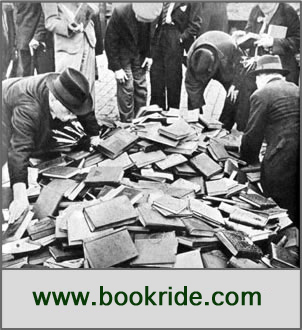
Filippo Tommaso Marinetti. ZANG TUMB TUUM (Adrianopoli, Ottobre 1912 : Parole in Libertà.) Poesia, Milan, 1914.
Current Selling Prices
$3000+ /£2000+
SOUND POETRY/ FUTURISM / ARTIST'S BOOK
The kind of book you could theoretically find in the foreign language section of a doltish bookseller ignorant of modern art, poetry and European literature - plenty of chaps like that + the book is not on the net. This might trigger some sort of high pricing response and they might go for something extravagant like $375, a fairly typical bookseller's price for a book that is 'not on net.' Of course it's a marvellous piece of work by the great Italian futurist (alright he was a bit of a fascist) and remarkable for 1914. At 225 pages it is not a pamphlet but not a fat book. The BM lists two sizes 19cms tall and 28 cms tall.
The book had appeared in excerpts in journals between 1912 and 1914 and is one of the very first manifestations of the modernist avant-garde, well before the Cabaret Voltaire bunch launched DADA in 1916 and even the Vorticists and their fabulous puce BLAST manifesto (1914.) In FUTURISM by Caroline Tisdall & Angelo Bozzolla (T & H 1977) they say this of it:-
"[The] masterpiece of Words-in-freedom and of Marinetti’s literary career was the novel ‘Zang Tumb Tuuum’... the story of the siege by the Bulgarians of Turkish Adrianople in the Balkan War, which Marinetti had witnessed as a war reporter. The dynamic rhythms and onomatopoetic possibilities that the new form offered were made even more effective through the revolutionary use of different typefaces, forms and graphic arrangements and sizes that became a distinctive part of Futurism. In ‘Zang Tumb Tuuum; they are used to express an extraordinary range of different moods and speeds, quite apart from the noise and chaos of battle.... Audiences in London, Berlin and Rome alike were bowled over by the tongue-twisting vitality with which Marinetti declaimed ‘Zang Tumb Tuuum.’ As an extended sound poem it stands as one of the monuments of experimental literature, its telegraphic barrage of nouns, colours, exclamations and directions pouring out in the screeching of trains, the rat-a-tat-tat of gunfire, and the clatter of telegraphic messages"OUTLOOK/VALUE? Futurism was in the doldrums for a while but recent records show some highish prices. An inscribed 'Zang Tumb' in slightly shabby shape made £2600 at Bloomsbury last May, a better inscribed copy sold in 1993 also at Bloomsbury (to a dealer called Gidal) for a paltry £250. Before that the Tate Gallery bought a copy for £65 just 30 years ago (also inscribed-- Marinetti was a great signer.) Meanwhile the chef d'oeuvre of Futurism, albeit after the event (1932) 'Parole in Liberta Futuriste Olfattive Tattili Termiche' sometimes known as 'the tin book' (see below) made $70,000 in 1993 and the BM bought a copy this year for a generous £83000. It consist of 15 thin metal sheets in various colors and will be on display. This price was paid to another institution and rather like collector-to -collector sales may have been toppish especially in these times. 25 years ago it sold for £4000- a sound investment.
Marinetti's 'La Cucina Futurista' (also 1932) is not without interest -full of outlandish ingredients and bizarre combinations. He even dared to attack pasta - he insisted that it induced 'fiacchezza, pessimismo, inattività nostalgica e neutralismo' ('lethargy, pessimism, nostalgic inactivity, and neutralism'). This anti - pasta cookbook might also be found in our imaginary doltish bookshop in the cookery section for $10 but it can make $1000 + for smart copies. I have a customer for one...


















